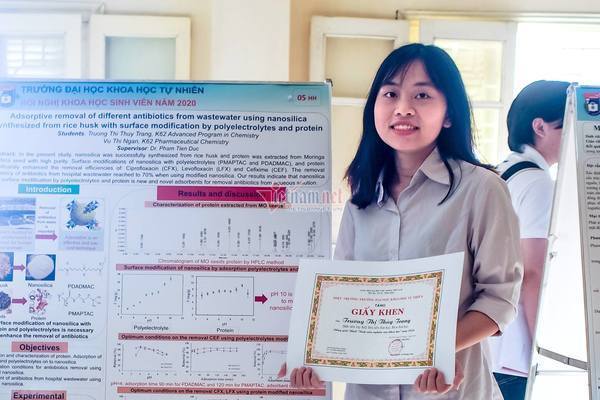
A scientific article on Truong Thi Thuy Trang's project on a new material made from rice husks, an agricultural by-product, that removes antibiotics in wastewater has been published in an ISI-Q1 international scientific journal.
 |
| Truong Thi Thuy Trang. |
A scientific article on Truong Thi Thuy Trang's project on a new material made from rice husks, an agricultural by-product, that removes antibiotics in wastewater has been published in an ISI-Q1 international scientific journal.
Trang is a student in the advanced training program of the Chemistry Faculty at the Hanoi University of Natural Sciences, a member school of the Vietnam National University, Hanoi.
In the article, Trang describes treating polluting organic compounds in medical wastewater by an adsorption method using Nanosilica material made from rice husks modified by self-synthetic polymers.
The method helps prevent the release of antibiotics that affects the environment. The material used for adsorption is sustainable and environmentally friendly. Rice husks, which are thrown away by farmers, are now useful, thanks to Trang’s project.
Dreams turns reality
In her childhood, Trang, when seeing wastewater going directly to the canal near her house, dreamed that she could clean up the canal when she grew up. The dream became more realistic when she began to study chemistry at university.
When she was a second-year student, she worked in the laboratory of Dr Pham Tien Duc, (Analytical Chemistry, Faculty of Chemistry, Hanoi University of Natural Sciences, Vietnam National University, Hanoi) and had the opportunity to study the creation of Nanosilica material from rice husks under Duc’s guidance.
The student found the project interesting as it could take full advantage of the rice husks generated during the agricultural production process to create new materials that support environmental cleaning.
After reading documents left by predecessors and international articles, she created an experiment execution plan and manufacturing process with the support of the teacher and co-workers in the laboratory.
“To create the material, I had to spend hours to carry out the stages of heating and drying rice husks,” she recalled.
"The teacher required that experiments be carried out repeatedly and carefully in each stage, saying that a minor mistake will lead to big failure,” she said, adding that she could not remember how many times she failed and had to repeat the experiments.
“My experiments for one month did not bring any results. I felt so discouraged as I could not find the reasons,” she recalled.
However, Trang finally found the problem and fixed it.
With great effort, Trang and her team succeeded and the project won first prize at the school’s competition for students’ scientific research and a consolation prize at a competition at the ministerial level.
Duc then encouraged Trang to collect data to write a scientific article.
The article was published in Progress in Organic Coating (ISI, Q1, IF 4.469).
Success
Trang’s research found that the absorption capability is over 90 percent in laboratory conditions. The efficiency of removing antibiotics in hospital wastewater is over 75 percent. The material can be reused three times.
Trang said that it was difficult to write the article because good English skills are needed to exactly express her ideas.
“I try to practice English every day. Luckily, all the subjects at the school are taught in English,” she said.
Trang is now the author of two ISI-Q1 articles with high IF (impact factor), and the first author of one of the two articles.
Trang is an excellent student with a GPA (grade point average) of 3.5/4.0 during her four years at school. She is going to defend her graduation thesis in June. She plans to continue studying for a master’s degree and follow scientific research.
Asked about his student, Duc said she is a good student with a passion for scientific research. It is her determination to discover new knowledge through scientific research that has brought her success.
(Source: VNA)




